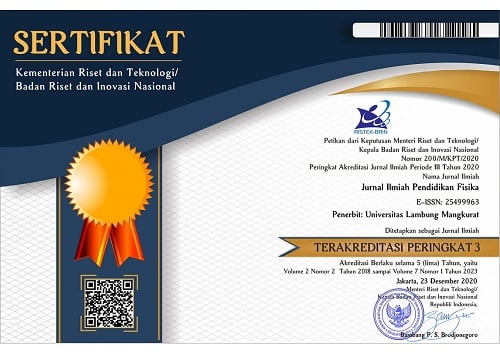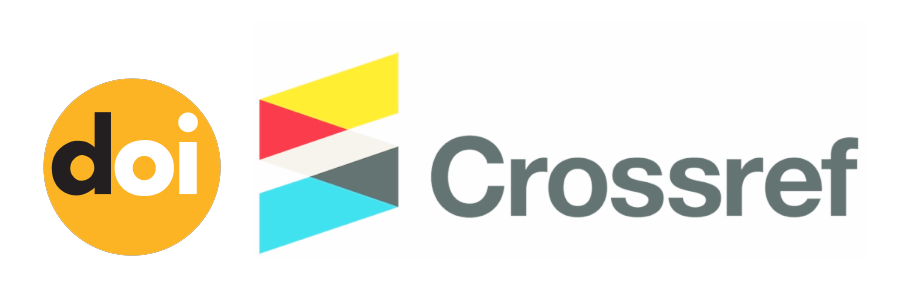Application of Media Combination of PhET Simulation and Spring Balance on Mathematical Concept Understanding of Grade XI Students on Vector Material
Abstract
This study aims to determine the improvement in mathematical concept understanding of grade XI students after applying the combined media of PhET simulation and spring balance to vector material. The type of research used (pre-experimental) using a one-group pretest-posttest design. The sampling technique used is purposive sampling, namely 30 class XI MIPA 1 MAN Kota Palangka Raya students. Concept understanding data were analyzed using descriptive and inferential methods. Based on data analysis, it was found that the average pretest score was 23.4 while the post-test was 87.5. The t-test results show that 𝑡-count = -39.594 < 𝑡-𝑡𝑎𝑏𝑒𝑙 = 3.39624. Thus, it can be concluded that HO is rejected and HA is accepted, so there is a significant increase in the understanding of mathematical concepts of class XI students on vector material before and after applying to learn using a combination of PhET simulation media and spring balance. The implication of using the media is that it provides significant benefits in understanding mathematical concepts, skill development, and student engagement in learning so that students are more focused and learning becomes directed.
Keywords
Full Text:
PDFReferences
Abdi, M. U., Mustafa, M., & Pada, A. U. T. (2021). Penerapan pendekatan STEM berbasis simulasi PhET untuk meningkatkan pemahaman konsep fisika peserta didik. JIPI (Jurnal IPA dan Pembelajaran IPA), 5(3), 209-218.
Agung, S. (2018). Agung, S. (2018). Pemanfaatan aplikasi geogebra dalam pembelajaran matematika SMP. Prosiding, 3(1).
Annovasho, J., & Budiningarti, H. (2014). Pengaruh penggunaan model pembelajaran berdasarkan masalah terhadap hasil belajar siswa kelas X peminatan MIPA pada pelajaran fisika materi fluida statik di SMA Negeri 1 Baureno Bojonegoro. Inovasi Pendidikan Fisika, 3(3), 20-26.
Aras, M., Persada, I. N., & Nabella, S. D. (2023). The influence of service quality, Trust, and facilities on the decision to choose SP Hotel Batam. International Journal of Accounting, Management, Economics and Social Sciences (IJAMESC), 1(4), 417-431.
Carlson, L. E., & Sullivan, J. F. (1999). Hands-on engineering: learning by doing in the integrated teaching and learning program. International Journal of Engineering Education, 15(1), 20-31.
Dhawan, S. (2020). Online learning: A panacea in the time of COVID-19 crisis. Journal of educational technology systems, 49(1), 5-22.
Doyan, A., & Harjono, A. (2022). Development of learning Media for wave ripple tanks with the implementation of guided inquiry models on students' mastery of concepts and scientific creativity. Jurnal Penelitian Pendidikan IPA, 8(2), 985-991.
Durkaya, F. (2023). Virtual laboratory use in science education with digitalization. Hungarian Educational Research Journal, 13(2), 189-211.
Eveline, E., Wilujeng, I., & Kuswanto, H. (2019, June). The effect of scaffolding approach assisted by PhET simulation on students’ conceptual understanding and students’ learning independence in physics. Journal of Physics: Conference Series, 1233 (1), 012036. IOP Publishing.
Flick, L. B. (1993). The meanings of hands-on science. Journal of Science Teacher Education, 4(1), 1-8.
Hasibuan, H. A., Rahayu, P., Sihombing, P. R. U. N., & Nasution, S. K. (2024). Meta analisis model pembelajaran kooperatif tipe group investigation terrhadap hasil belajar fisika siswa di sma. Jurnal Bintang Pendidikan Indonesia, 2(1), 54-66.
Ismaun, I. (2019). Pengaruh media PhET simulations terhadap pemahaman konsep model molekulsiswa sma negeri 1 mawasangka. Al-TA'DIB: Jurnal Kajian Ilmu Kependidikan, 12(1), 99-115.
Khofifah, K., Yuliani, H., & Santiani, S. (2024). Meta-analysis: The effect of PhET simulation media on enhancing conceptual understanding in physics learning. Jurnal Ilmiah Pendidikan Fisika, 7(3), 532-543.
Khumaidi, A., & Amalia, S. (2023). Efektivitas laboratorium virtual dan laboratorium nyata selama pandemi covid-19 pada materi vektor SMA. PenaEmas, 1(1), 1-11.
Kristanti, F. R., Isnarto, I., & Mulyono, M. (2019). Kemampuan pemahaman konsep matematis siswa dalam pembelajaran flipped classroom berbantuan sndroid. In Prosiding Seminar Nasional Pascasarjana (Vol. 2, No. 1, pp. 618-625).
Kurniawan, R. A., Rifa’i, M. R., & Fajar, D. M. (2020). Analisis kemenarikan media pembelajaran phet berbasis virtual lab pada materi listrik statis selama perkuliahan daring ditinjau dari perspektif mahasiswa. VEKTOR: Jurnal Pendidikan IPA, 1(1), 19-28.
Lubis, I. L. (2009). Tingkatan pemahaman mahasiswa pada konsep fisika. Media Infotama, 4(8), 14-22.
Mahtari, S., Wati, M., Hartini, S., Misbah, M., & Dewantara, D. (2020). The effectiveness of the student worksheet with PhET simulation used scaffolding question prompt. Journal of Physics: Conference Series, 1422(1), 012010. IOP Publishing.
Marbun, B. T., Rosanti, D. A., & Nafariahartini, Y. P. (2022, November). Penggunaan web PhET colorado untuk membantu pembelajaran siswa sekolah dasar. In Proseding Didaktis: Seminar Nasional Pendidikan Dasar, 7(1), 1055-1066.
Maulani, R. N., Wati, M., Misbah, M., Dewantara, D., & Mahtari, S. (2018). The development of the PhET learning program's learning support worksheet. Prosiding Seminar Nasional Fisika (SNF), 2, 105-110).
Mawaddah, S., & Maryanti, R. (2016). Kemampuan pemahaman konsep matematis siswa SMP dalam pembelajaran menggunakan model penemuan terbimbing (discovery learning). EDU-MAT: Jurnal Pendidikan Matematika, 4(1).
Morales, D., Pardo, L., & Vajda, I. (1997). Some new statistics for testing hypotheses in parametric models. Journal of Multivariate Analysis, 62(1), 137-168.
Muzana, S. R., & Astuti, D. (2017). Penerapan pembelajaran berbasis simulasi PhET untuk meningkatkan pemahaman konsep fisika inti pada siswa SMA. In Prosiding SEMDI-UNAYA (Seminar Nasional Multi Disiplin Ilmu UNAYA), 1(1), 409-417.
Nisa, H., Junus, M., & Komariyah, L. (2022). Penerapan model problem based learning berbantuan simulasi PhET berbasis instrumen HOTS terhadap hasil belajar siswa. Jurnal Ilmiah Pendidikan Fisika, 6(3), 560-567.
Nurdini, S. D., Husniyah, R., Chusni, M. M., & Mulyana, D. E. (2022). Penggunaan physics education technology (phet) dengan model inkuiri terbimbing untuk meningkatkan hasil belajar siswa pada materi fluida dinamis. Jurnal Ilmiah Pendidikan Fisika, 6(1), 136-146.
Poernomo, U., & Wulansari, N. (2015). Poernomo, U. D., & Wulansari, N. A. (2015). Pengaruh konflik antara pekerjaan-keluarga pada kinerja karyawan dengan kelelahan emosional sebagai variabel pemediasi. Management Analysis Journal, 4(3).
Pujiyono, P., Sudjito, D. N., & Sudarmi, M. (2016). Desain pembelajaran dengan menggunakan media simulasi phet (physics education and technology) pada materi medan listrik. UPEJ Unnes Physics Education Journal, 5(1).
Rahayu, O. F. G. A., Jufriadi, A., & Pratiwi, H. Y. (2019). Pengaruh model pembelajaran inkuiri terbimbing berbantuan media animasi PhET terhadap motivasi dan prestasi siswa kelas VIII pada materi gerak dan gaya di smp pgri 6 malang. Semnas SENASTEK Unikama 2019, 2.
Ramadani, E. M., & Nana, N. (2020). Penerapan problem based learning berbantuan virtual lab phet pada pembelajaran fisika guna meningkatkan pemahaman konsep siswa sma: Literature review. JPFT (Jurnal Pendidikan Fisika Tadulako Online), 8(1).
Rizaldi, D. R., Jufri, A. W., & Jamaluddin, J. (2020). PhET: Simulasi interaktif dalam proses pembelajaran fisika. Jurnal Ilmiah Profesi Pendidikan, 5(1), 10-14.
Rymarczyk, J. (2020). Technologies, opportunities and challenges of the industrial revolution 4.0: theoretical considerations. Entrepreneurial business and economics review, 8(1), 185-198.
Saregar, A. (2016). Pembelajaran pengantar fisika kuantum dengan memanfaatkan media phet simulation dan LKM melalui pendekatan saintifik: Dampak pada minat dan penguasaan konsep mahasiswa. Jurnal ilmiah pendidikan fisika Al-Biruni, 5(1), 53-60.
Sarwono, J. (2007). Analisis jalur untuk riset bisnis dengan SPSS. Yogyakarta: Andi Offset.
Sasmita, P. R. (2017). Penerapan metode inkuiri terbimbing menggunakan media kit fisika: upaya meningkatkan aktivitas dan hasil belajar fisika siswa. Jurnal Ilmiah Pendidikan Fisika Al-Biruni, 6(1), 95-102.
Selisne, M., Sari, Y. S., & Ramli, R. (2019, April). Role of learning module in STEM approach to achieve competence of physics learning. Journal of Physics: Conference Series, 1185(1), 012100. IOP Publishing.
Setiani, N., Roza, Y., & Maimunah, M. (2022). Analisis kemampuan siswa dalam pemahaman konsep matematis materi peluang pada siswa smp. Jurnal Cendekia: Jurnal Pendidikan Matematika, 6(2), 2286-2297.
Wamunyima, N. (2023). Pre-experimental design in project evaluation: the case of the scaling-up nutrition (SUNI) project. SAGE Publications.
Yılmaz, A., & Duygulu, S. (2021). Developing psychological empowerment and patient safety culture: A Pre-experimental study. Journal of Basic and Clinical Health Sciences, 5(2), 94-103.
Yusuf, M., & Ichsan, R. N. (2021). Analysis of banking performance in the aftermath of the merger of bank syariah indonesia in Covid 19. International Journal of Science, Technology & Management, 2(2), 472-478.
Yuwarti, Y., Pasaribu, M., & Hatibe, A. (2017). Analisis pemahaman konsep vektor pada siswa SMA Negeri 5 Palu. JPFT (Jurnal Pendidikan Fisika Tadulako Online), 5(3), 12-15.
DOI: https://doi.org/10.20527/jipf.v8i2.11708
Refbacks
- There are currently no refbacks.
Indexed by: Jurnal Ilmiah Pendidikan Fisika is licensed under a creative commons attribution-share alike 4.0 international license
Statistics Counter |
















